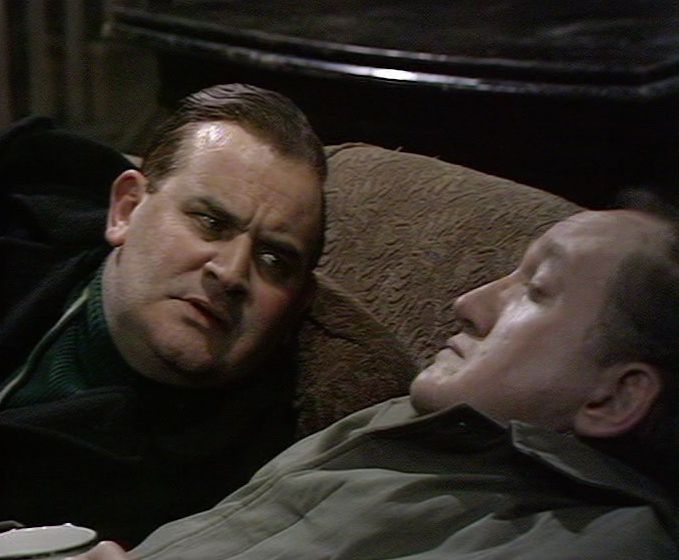7 of 1 served a dual purpose – not only was it a showcase for Ronnie Barker (allowing him to assume a variety of very different roles) but it also was a collection of pilots that could, potentially, be developed further.
Indeed, the first three episodes were all spun off into series. First there was Open All Hours (no prizes for working out what that became) followed by Prisoner and Escort (Porridge) and finally My Old Man (which ended up on ITV with Clive Dunn inheriting the Barker role).
Famously, out of the two episodes written by Clement & La Frenais (Prisoner and Escort, I’ll Fly You For A Quid) Barker felt that the latter one had more scope. History has proved that, on this occasion, his judgement was slightly faulty.
Although many of the building blocks of Porridge (which began in September 1974) are already present, it’s also interesting to note the differences.
Fletch’s baiting of Mr Mackay (Fulton Mackay) is already firmly in place (“I spy with my little eye something beginning with C”) as is the way that Fletch can effortlessly wrap the pliable Mr Barrowclough (Brian Wilde) around his little finger. Although in Prisoner and Escort, Fletcher is harsher (watch how, in the railway carriage, he cuts across Barrowclough in order to make his own points).
Since Mackay is absent for large stretches, Prisoner and Escort is essentially a two-hander between Fletch and Barrowclough. Holed up in a lonely cottage hours from anywhere (after Fletch sneakily directs his urine into the van’s petrol tank) the pair share a bottle of whisky as Barrowclough is encouraged to open up his heart.
We hear for the first time about Barrowclough’s unhappy home life (his unseen wife – here described as a serial philanderer – would become an item of interest in the future, not least in one of the Christmas specials) and he also admits that his career has been a complete and utter failure. This is tragic stuff (Wilde is so good) especially when you realise that Fletch is simply waiting for Barrowclough to fall unconscious so that he (Fletch) can make a break for it.
Barker’s wolfish expression as the oblivious Barrowclough chatters on is a little bit chilling – in the future Fletch could be hard, but he’d never be quite so menacing as he is here.
And, of course, based on what we later learn, it’s totally out of character for Fletch to attempt to escape. But as a set-piece moment in what could have been just a one-off, it’s fine (especially when the gag – Fletch wanders around the moor for hours and is eventually shocked to find out he’s walked in a complete circle and has returned to the cottage – is played so well by Barker).
Prisoner and Escort ends with Fletch having finally arrived at the prison (not yet called Slade). He’s in a cell that looks nothing like the one he’d later occupy and the fact he’s already quite comfy means that a bit of retconning has to be done with the first episode of Porridge (Old Faces, New Hands) which implies that Fletch, Godber and Heslop had all arrived together.










